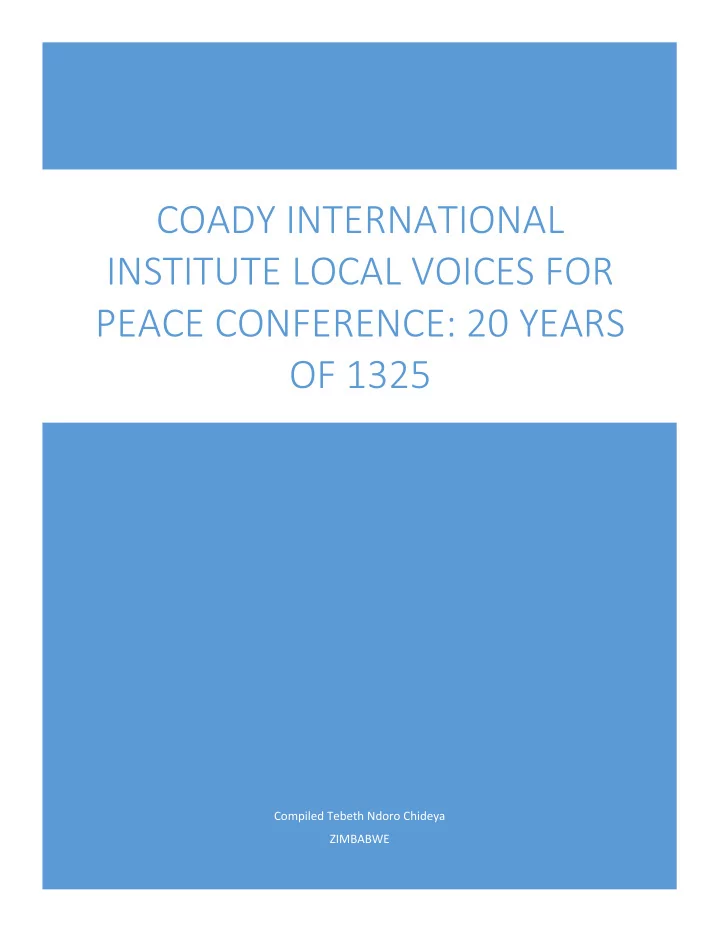

COADY INTERNATIONAL INSTITUTE LOCAL VOICES FOR PEACE CONFERENCE: 20 YEARS OF 1325 Compiled Tebeth Ndoro Chideya ZIMBABWE
LOCAL WOMEN’S VOICES FOR PEACE: 20 YEARS OF 1325 My name is Tebeth Ndoro-Chideya from Seke in Zimbabwe. I am the project director of the Gender Peace and Security Network (GPSN). I initiated the network some ten years ago as part of my community service program with Zimbabwe Open University (ZOU) where I lectured for ten years, mostly with the department of Peace and Leadership on full time basis and also coordinated the program. I am now part time lecturer with the university and devoting more time to the Community Peace Program. The program is also focusing on Peace, Livelihoods and Environment. Our members believe that the culture of peace will be achieved when citizens of the world:- a. Understand global problems b. Have skills to resolve conflicts c. Struggle for justice and non-violence d. Live by international standards of human rights, equality, appreciate cultural diversity and respect others, liberty, justice, solidarity, human rights and culture, equality between women and men and the rights of the child The Gender Peace and Security Network is also in the process of setting a Community Centre for peace research and community development. University students would do joint research with members of the community and also various community development courses will be carried out at THE CENTRE to cover Mashonaland East as I am also in the committee of Zimbabwe National Peace and Reconciliation Commission for Mashonaland East. The Security Council has marked the anniversary of this resolution annually. However, as the twentieth anniversary of 1325 is approaching in October 2020, there are still gaps in the implementation and accountability of the resolution in Zimbabwe and some parts of the region as a whole. The United Nations has directed that regional organizations implement this resolution, as a result African Union and SADC had to ratify it. One of the requirement was 33% representation of women in Decision making. The Resolution has been embraced by a number of organizations that are complementing government efforts in Zimbabwe. The stakeholders that we are working with are: a) government departments particularly the Ministry of Women Affairs and Gender b) the Women’s Coalition of Zimbabwe c) the academia d) the Gender Commission e) the National Peace and Reconciliation Commission and f) a good number of NGOs that are working in the field of peace and community development.
Majo jor a ach chievements ts As far as UNSCRR 1325 is concerned, Zimbabwe has made significant progress in achieving gender equality. Having lectured in the field of peace for several years, there has been an increase in the number of female leaders registering to take up peace studies at universities in Zimbabwe. Policies were put in place to protect girls and women’s rights in employment, decision making, health, education, economic empowerment, access and control of resources and the family. For instance, the enactment of the Domestic Violence Act (2006) aimed at protecting women from abuse All the legislative pieces have since been enshrined in the Constitution. Signed into law in 2013, the Constitution has legal provisions to the Government, private sector, traditional and religious leaders, all institutions in society to ensure that everyone has equal access to resources and opportunities For long, women were not able to fully participate in the economy because they were considered as minors and needed the permission of their husbands, fathers or stewardship of a male relative to support their action of intent. Women are now able to vote, access funds from financial institutions and enter into business deals without consulting a male relative. Women can now own land in their own right, moving away from the traditional norms and customs where they only accessed land through their husbands, fathers and other male relatives. As a result of progressive laws, women now have control over the means of production. Ch Challenge ges The corona virus has further burdened women especially grassroot women who already bear the brunt of unpaid care work Gender-based violence, child marriages and a decline in the number of women participating in the economy and politics has regressed gains made towards equality, amid continued violation of women over the years. There is little or no information at grassroot level on resolution 1325. D espite the changes in the policy position, women’s access to land remains limited due to a variety of factors, with patriarchy being the biggest impediment . Continued abuse of women, rigid gender stereotypes where women are treated as minors, violence against women, under-representation of women in political and economic spaces and social structural obstacles stand in the way of gender equality.
Reco commendati tions There is need to ensure domestication of the resolution right down to the grassroots level where the majority of the women are. The implementation plan for UNSCR 1325 should contain performance indicators that are measurable The Action Plan should include ICTs as they have become key in the involvement of women in peace and security issues There is need to invest in young women in order to capacitate them so that they become partners in peace and security processes. Promotion of peace dialogues at local, national, regional and international level. Continue to engage with governments to review and revise national policies to ensure compliance with UNSCR 1325 as well as other instruments on women’s rights, such as the Convention on the Elimination of All Forms of Discrimination Against Women (CEDAW) There is need for the government and stakeholders to fundraise for more resources to ensure UNSCR 1325 becomes a reality.
Recommend
More recommend